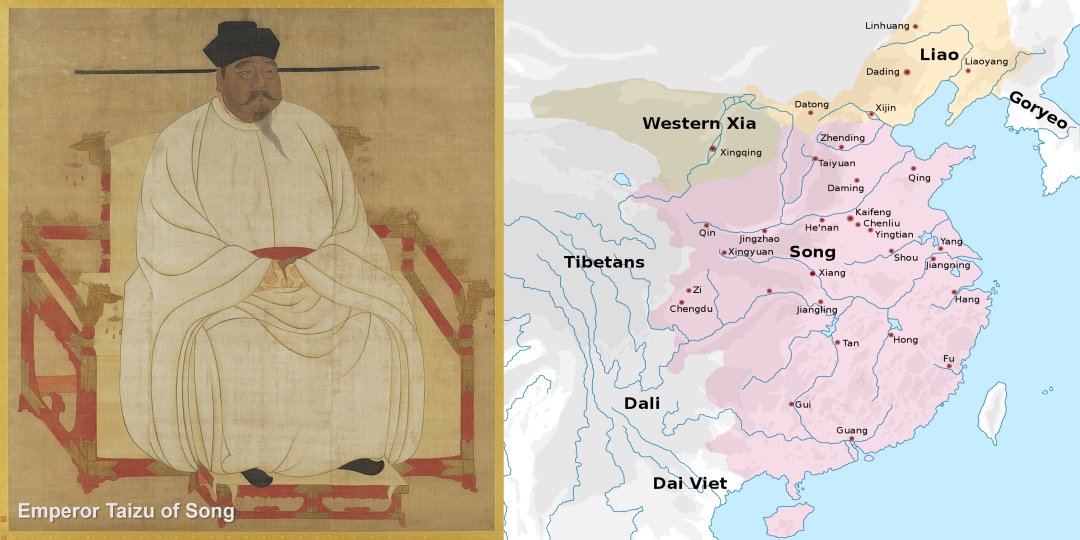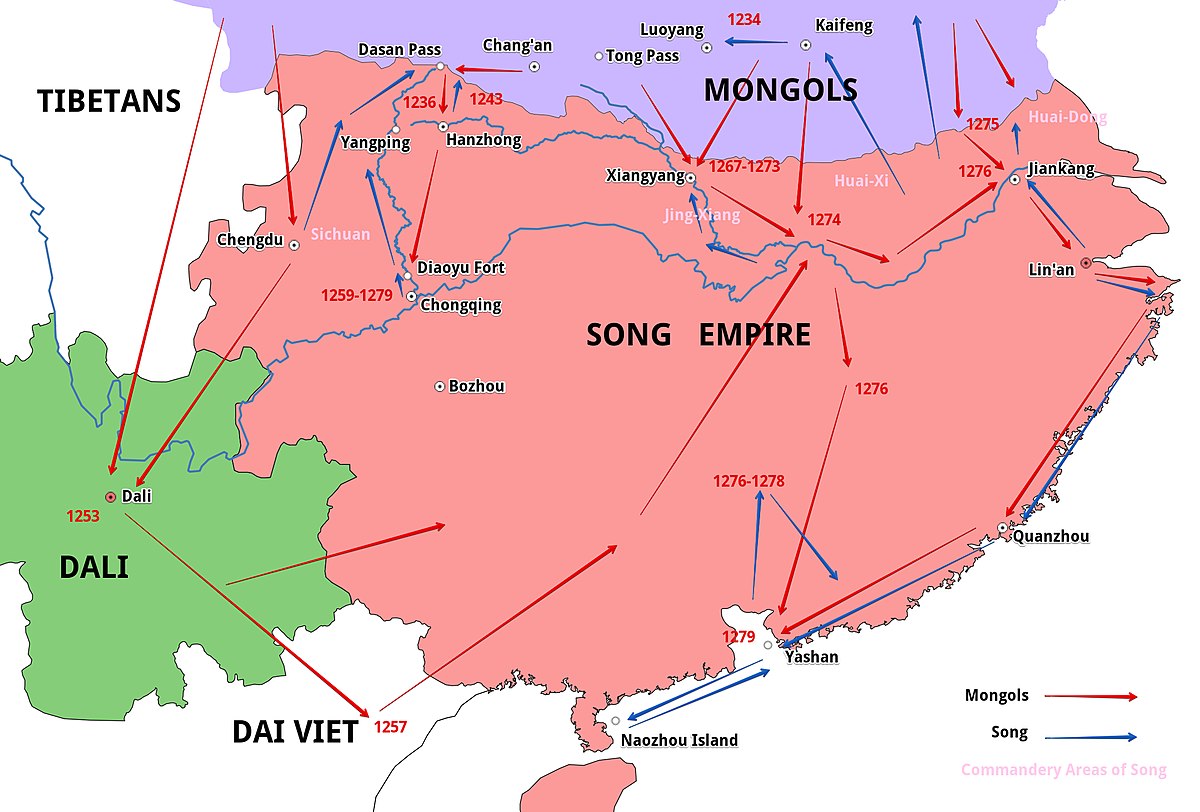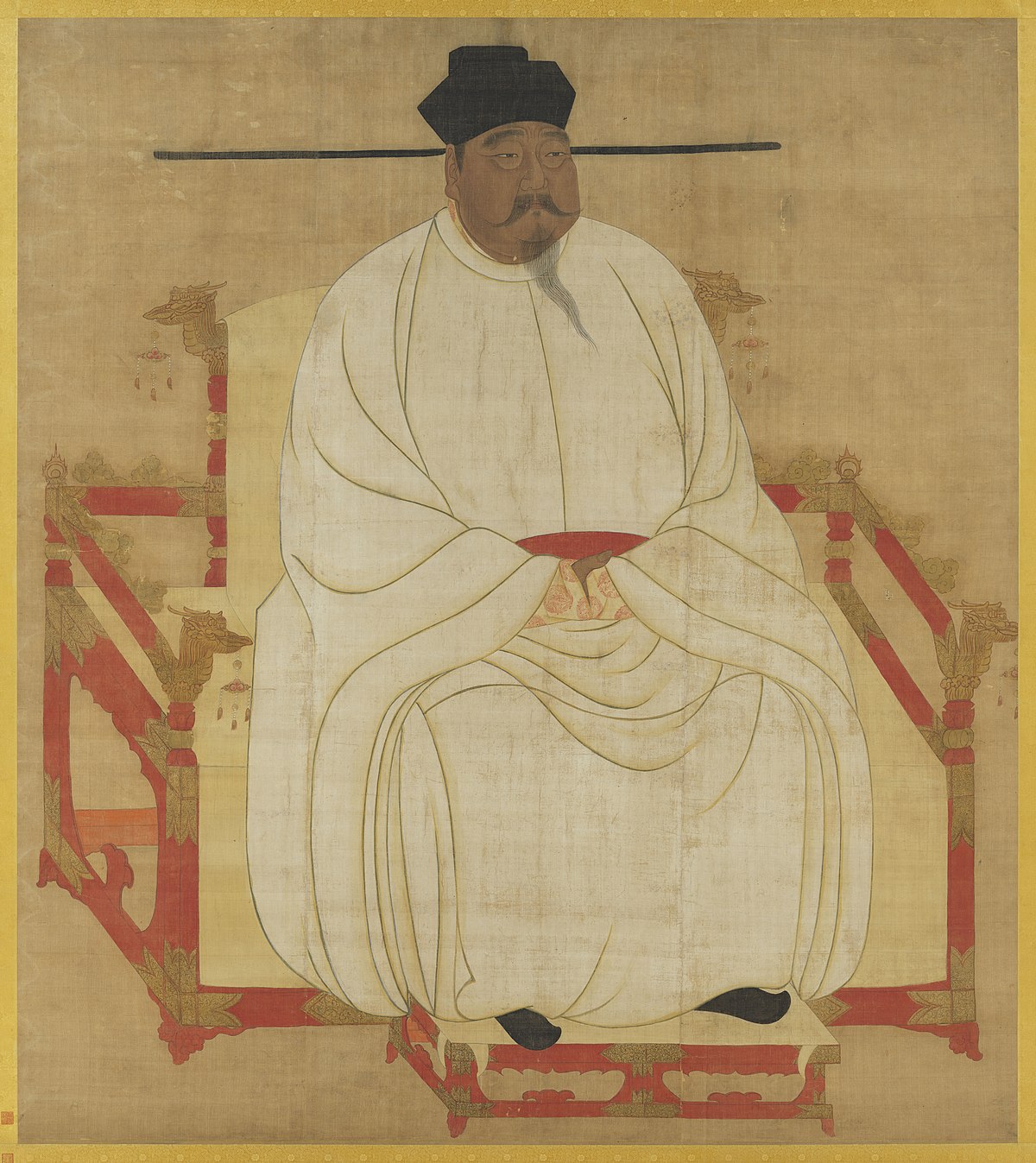Chinese Emperors and Empresses: The Fall of the Northern Song
The fall of the Northern Song Dynasty (960–1127) marks a pivotal moment in Chinese history, as a once-flourishing empire succumbed to internal strife and external threats. Renowned for its cultural achievements and economic prosperity, the Northern Song faced mounting challenges, including bureaucratic corruption, military weaknesses, and relentless pressure from nomadic tribes like the Jurchens. The dynasty's collapse in 1127, following the infamous Jingkang Incident, saw the capture of Emperor Qinzong and his father, Huizong, plunging China into a period of turmoil. This article explores the key factors behind the Northern Song's demise, shedding light on the emperors and empresses whose decisions shaped its tragic end.
- The Decline and Fall of the Northern Song Dynasty: Emperors and Empresses in Crisis
- What was the fall of the Northern Song Dynasty?
- Which empire leads to the downfall of the Song dynasty?
- Who was the emperor of the Northern Song?
- What happened during the Song dynasty in China?
- Frequently Asked Questions (FAQ)
The Decline and Fall of the Northern Song Dynasty: Emperors and Empresses in Crisis
The Northern Song Dynasty (960–1127) marked a period of cultural and economic prosperity in Chinese history, yet its eventual collapse was shaped by weak leadership, military failures, and external threats. The dynasty's emperors and empresses struggled to maintain control as internal corruption and invasions from the Jurchen-led Jin Dynasty eroded their power. This section explores the key figures and events that led to the fall of one of China's most influential dynasties.
The Weak Leadership of Emperor Huizong
Emperor Huizong (1100–1125) was a refined scholar and artist but an ineffective ruler. His obsession with art and Daoism diverted attention from governance, while his reliance on corrupt officials worsened administrative inefficiency. His disastrous alliance with the Jurchens against the Liao Dynasty backfired, leading to the Jin invasion and the eventual sack of Kaifeng, the Northern Song capital.
See AlsoTop 8 Ways Chinese Teachers Can Use ChatGPT to Create Lesson Plans| Aspect | Impact |
|---|---|
| Artistic Patronage | Neglected military and economic reforms |
| Corrupt Advisors | Weakened central authority |
| Jin Alliance | Led to the fall of Kaifeng |
The Role of Empress Dowager Xiang
Empress Dowager Xiang, regent during Emperor Qinzong's reign, attempted to stabilize the dynasty amid the Jin invasion. However, her efforts were undermined by political infighting and the overwhelming military superiority of the Jurchens. Her negotiations with the Jin failed, resulting in the capture of the imperial family in 1127, known as the Jingkang Incident.
| Action | Outcome |
|---|---|
| Diplomatic Talks | Delayed but did not prevent invasion |
| Regency Struggles | Weakened court unity |
The Military Failures Against the Jin
The Northern Song military was ill-prepared to face the Jurchen cavalry. Despite technological advancements like gunpowder weapons, poor leadership and lack of coordination led to catastrophic defeats. The loss of Kaifeng in 1127 marked the end of the Northern Song, forcing the remnants of the court to flee south and establish the Southern Song Dynasty.
| Factor | Consequence |
|---|---|
| Weak Generals | Failed defensive strategies |
| Gunpowder Misuse | Not effectively deployed |
Heavy taxation and land inequality fueled peasant discontent, while the government's focus on urban elites alienated rural populations. The economic strain from constant warfare drained resources, leaving the dynasty vulnerable to collapse.
See AlsoChina’s ’38 Yuan Large Prawn’ Scandal Leaves Sour Taste| Issue | Effect |
|---|---|
| High Taxes | Peasant revolts |
| Urban Bias | Neglected rural stability |
The Jingkang Incident: The Final Blow
In 1127, the Jingkang Incident saw the Jurchen forces capture Emperor Qinzong, Emperor Huizong, and much of the imperial court. This humiliation ended the Northern Song, with survivors regrouping under Emperor Gaozong to form the Southern Song Dynasty.
| Event | Significance |
|---|---|
| Imperial Capture | Symbolized dynasty's fall |
| Southern Migration | Birth of Southern Song |
What was the fall of the Northern Song Dynasty?

Political Instability and Internal Struggles
The fall of the Northern Song Dynasty (960–1127) was heavily influenced by political instability and internal conflicts. The government faced factionalism among scholar-officials, corruption, and ineffective leadership, weakening the dynasty's ability to respond to external threats.
See AlsoNBA: Why is it so popular in China?- The New Policies of Wang Anshi caused divisions among officials, leading to bureaucratic infighting.
- Emperor Huizong's mismanagement and focus on arts over governance further destabilized the regime.
- Military oversights, such as underfunding the army, left the dynasty vulnerable to invasions.
Military Weakness and the Jin Invasion
The Northern Song Dynasty collapsed after the Jin Dynasty (Jurchens) launched a devastating invasion in 1125–1127. The Song military, despite technological advancements like gunpowder, lacked coordination and strategic leadership.
- The Jin forces exploited Song's weak northern defenses, capturing key cities like Kaifeng.
- The siege of Bianjing (1127) resulted in Emperor Huizong and Qinzong's capture, ending Northern Song rule.
- Poor alliance decisions, like abandoning the Khitan Liao Dynasty, backfired when the Jin turned on the Song.
Economic Challenges and Financial Strain
Economic troubles exacerbated the Northern Song's decline. Heavy taxation, inflation, and military expenses drained resources, making the dynasty unable to sustain its defenses.
- The land tax system burdened peasants, causing widespread discontent.
- Excessive spending on urban projects and the imperial court diverted funds from critical needs.
- Trade disruptions due to northern invasions crippled revenue from the Silk Road and maritime trade.
Role of the Jurchen Jin Dynasty
The rise of the Jurchen Jin Dynasty was a decisive factor in the Northern Song's fall. Initially allies against the Liao, the Jin quickly became a mortal threat after conquering northern China.
- The Jin's superior cavalry outmatched the Song's infantry-focused army.
- Failed diplomatic negotiations, including broken treaties, provoked full-scale war.
- The Jin's capture of Kaifeng in 1127 marked the official end of the Northern Song.
Legacy and Transition to the Southern Song
After the fall, the Southern Song Dynasty (1127–1279) emerged, relocating the capital to Lin'an (Hangzhou). This shift marked a cultural and economic continuation but under reduced territory.
- The loss of the north forced reliance on maritime trade, boosting southern ports.
- Cultural achievements, like Neo-Confucianism, flourished despite political fragmentation.
- The Southern Song maintained resistance against the Jin but never reclaimed the north.
Which empire leads to the downfall of the Song dynasty?

The Mongol Empire and the Fall of the Song Dynasty
The Song Dynasty was ultimately overthrown by the Mongol Empire, led by Kublai Khan, the founder of the Yuan Dynasty. The Mongols, under the leadership of Genghis Khan and later his successors, had already conquered vast territories across Asia and Europe. By the mid-13th century, they turned their attention to Southern Song China, which had resisted earlier invasions.
- The Mongols utilized advanced siege warfare and adapted Chinese naval tactics to overcome the Song's defenses.
- Kublai Khan declared the establishment of the Yuan Dynasty in 1271, marking the official transition from Song to Mongol rule.
- The final defeat came in 1279 at the Battle of Yamen, where the last Song emperor drowned, ending the dynasty.
Military Strategies Used by the Mongols Against the Song
The Mongol Empire employed a combination of brutal force and strategic innovation to dismantle the Song Dynasty's defenses. Their ability to adapt and incorporate conquered peoples' technologies was key to their success.
- They used gunpowder weapons, borrowed from Chinese inventors, to breach fortified cities.
- The Mongols built a powerful navy, despite their steppe origins, to challenge the Song's maritime dominance.
- They implemented psychological warfare, spreading fear through massacres to force surrenders.
Key Battles Leading to the Song Dynasty's Collapse
Several critical battles marked the decline of the Song Dynasty and the rise of Mongol dominance in China.
- The Battle of Xiangyang (1267–1273) was a prolonged siege that weakened Song defenses.
- The Fall of Lin'an (1276), the Song capital, forced the imperial court to flee south.
- The Battle of Yamen (1279) was the final confrontation, resulting in the Song's complete defeat.
Political and Economic Weaknesses of the Song Dynasty
While the Mongol invasion was the direct cause of the Song's fall, internal issues made the dynasty vulnerable.
- The Song government was plagued by factionalism and corruption, weakening central authority.
- Economic strain from maintaining a large standing army and paying tributes to northern rivals drained resources.
- The Southern Song's reliance on maritime trade left them exposed when the Mongols targeted their ports.
Kublai Khan's Role in Establishing the Yuan Dynasty
Kublai Khan, grandson of Genghis Khan, played a pivotal role in ending the Song Dynasty and founding the Yuan Dynasty.
- He adopted Chinese administrative practices to legitimize his rule over conquered territories.
- Kublai moved the capital to Dadu (modern Beijing), signaling a shift in power from southern China.
- His policies integrated Mongol and Chinese systems, though ethnic tensions persisted.
Who was the emperor of the Northern Song?

Who was the first emperor of the Northern Song Dynasty?
The first emperor of the Northern Song Dynasty was Emperor Taizu (Zhao Kuangyin). He founded the dynasty in 960 AD after overthrowing the Later Zhou Dynasty. His reign marked the beginning of a period of stability and cultural flourishing in China.
- Emperor Taizu reunified much of China after the fragmentation of the Five Dynasties and Ten Kingdoms period.
- He implemented administrative reforms to centralize power and reduce the influence of military governors.
- His policies laid the foundation for the economic and cultural prosperity of the Northern Song.
What were the major achievements of the Northern Song emperors?
The Northern Song emperors oversaw significant advancements in technology, art, and governance. Their rule is often considered a golden age in Chinese history.
- Gunpowder, printing, and the compass were refined and widely used.
- The imperial examination system was expanded, promoting meritocracy.
- Landscape painting and poetry reached new heights under imperial patronage.
How did the Northern Song Dynasty end?
The Northern Song Dynasty ended in 1127 AD after the Jin Dynasty invaded and captured the capital, Kaifeng. This event, known as the Jingkang Incident, forced the Song court to flee south.
- The last emperor, Emperor Qinzong, was captured by the Jin forces.
- The surviving Song elite established the Southern Song Dynasty in Hangzhou.
- The fall marked the loss of northern territories to foreign rule.
Who were the most notable Northern Song emperors?
Several Northern Song emperors left a lasting legacy, including Emperor Taizu, Emperor Renzong, and Emperor Shenzong.
- Emperor Renzong (1022–1063) presided over a period of peace and cultural growth.
- Emperor Shenzong (1067–1085) supported Wang Anshi's reforms to modernize the economy.
- Emperor Huizong (1100–1125) was a renowned artist but his reign ended in disaster.
What was the role of the emperor in Northern Song governance?
The emperor in the Northern Song Dynasty was the supreme ruler, but governance relied on a sophisticated bureaucratic system.
- Emperors worked closely with the scholar-officials recruited through exams.
- They balanced military and civil authority to prevent regional warlordism.
- Imperial decrees were enforced by a centralized administrative network.
What happened during the Song dynasty in China?

Political Developments During the Song Dynasty
The Song Dynasty (960–1279) marked a period of significant political transformation in China. The dynasty was divided into two eras: the Northern Song (960–1127) and the Southern Song (1127–1279). Key political developments included:
- Centralized bureaucracy: The Song emperors strengthened the civil service examination system, reducing aristocratic power.
- Military challenges: The dynasty faced constant threats from northern nomadic tribes, leading to the loss of northern territories to the Jurchen Jin Dynasty.
- Diplomatic strategies: The Song used tributes and treaties, like the Chanyuan Treaty, to maintain uneasy peace with neighboring states.
Economic Growth and Innovations
The Song Dynasty experienced unprecedented economic prosperity, driven by agricultural, commercial, and technological advancements:
- Agricultural expansion: New rice varieties and irrigation techniques boosted food production.
- Market economy: The use of paper money (jiaozi) and the growth of trade networks stimulated commerce.
- Urbanization: Cities like Kaifeng and Hangzhou became bustling centers of industry and culture.
Technological and Scientific Achievements
The Song era was a golden age for Chinese inventions and scientific progress:
- Gunpowder: First widely used in warfare, revolutionizing military tactics.
- Movable-type printing: Invented by Bi Sheng, it transformed literacy and education.
- Compass navigation: Enhanced maritime trade and exploration.
Cultural and Artistic Flourishing
The Song Dynasty saw remarkable contributions to art, literature, and philosophy:
- Landscape painting: Artists like Fan Kuan perfected the shan shui (mountain-water) style.
- Neo-Confucianism: Philosophers such as Zhu Xi redefined Confucian thought.
- Poetry and prose: Literary giants like Su Shi produced enduring works.
Military Conflicts and Decline
Despite its cultural achievements, the Song Dynasty faced military weaknesses that led to its downfall:
- Jurchen invasions: The Jin-Song Wars forced the relocation of the capital southward.
- Mongol conquest: The Yuan Dynasty, under Kublai Khan, eventually conquered the Southern Song in 1279.
- Naval battles: The Song's advanced navy was ultimately overwhelmed by Mongol forces.
Frequently Asked Questions (FAQ)
What were the main causes of the fall of the Northern Song Dynasty?
The fall of the Northern Song Dynasty was primarily caused by a combination of internal corruption, military weaknesses, and external invasions. The dynasty faced persistent threats from the Jurchen-led Jin Dynasty, which exploited the Song's lack of a strong cavalry and defensive strategies. Additionally, political infighting and economic mismanagement weakened the empire from within, making it vulnerable to collapse when the Jin forces captured the capital, Kaifeng, in 1127 during the Jingkang Incident.
Who were the key emperors during the decline of the Northern Song Dynasty?
The decline of the Northern Song Dynasty saw several emperors whose reigns were marked by crisis. Emperor Huizong (r. 1100–1125) is often criticized for his neglect of governance in favor of artistic pursuits, while his successor, Emperor Qinzong (r. 1125–1127), faced the catastrophic Jin invasion. Both emperors were eventually captured by the Jin, leading to the dynasty's collapse. Earlier rulers like Emperor Shenzong and Emperor Zhezong also contributed to instability through controversial reforms and factional conflicts.
How did the Jin Dynasty contribute to the fall of the Northern Song?
The Jin Dynasty played a decisive role in the fall of the Northern Song by launching a series of devastating invasions. After forming an alliance with the Song to destroy the Liao Dynasty, the Jin turned against their former allies, exploiting the Song's military unpreparedness. In 1127, Jin forces besieged and sacked Kaifeng, capturing the emperor and much of the imperial family in an event known as the Jingkang Incident. This marked the end of the Northern Song and forced the remnants of the court to flee south, establishing the Southern Song Dynasty.
What were the long-term consequences of the Northern Song's collapse?
The fall of the Northern Song Dynasty had profound consequences for Chinese history. The shift to the Southern Song (1127–1279) saw a reduction in territorial control and a focus on cultural and economic development rather than military expansion. The loss of the north also intensified anti-nomadic sentiments and influenced later dynasties' policies toward border defense. Additionally, the collapse underscored the dangers of political factionalism and military neglect, lessons that resonated throughout subsequent Chinese regimes.
Leave a Reply

Related Posts